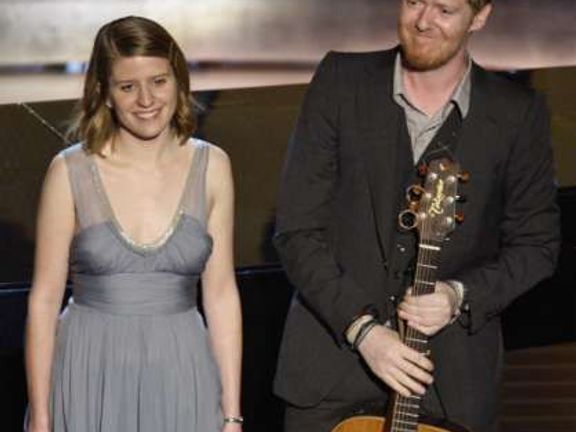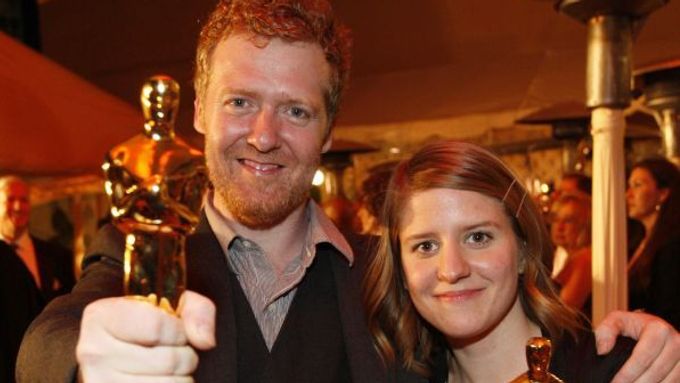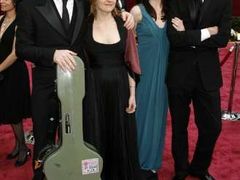Prague - The question was to be expected, in fact, it's peculiar it's being asked only now.
Media begin to wonder about how the success of the movie musical Once and its soundtrack translates into Marketa Irglova bank account statement.
Unlike the movie that gambled on direct, conflict-less and totally down-to-earth approach, the real life only gives hazy answers.
There are so many imponderables in the play that the money in the bank account could be virtually anything from a couple thousand to hundreds of thousands US dollars.
Budget repaid hundred times
It's difficult to make comparison with other domestic names that made it abroad. Not only because of the difference in both genre and context: music for the TV cartoon Maya the Bee is pollinating the charts and concerts in German speaking countries for much longer and with many more recordings.
The movie Once was shot within a fortnight in the streets of Dublin and in genuine interiors of the city's flats.
It tells the story of a chance meeting between a street musician and a young girl selling roses. Making of the film cost US$ 150,000, and made hundred times that sum since its release.
But there are not many more figures available. According to market research company Nielsen, 343,000 people bought the album with music from Once since last May; the recording was the tenth most sold soundtrack of the year.
Other sources say there were some half million copies sold of the soundtrack, which is especially popular on iTunes.
The Oscar success will definitely make this figure even higher. The fame of an independent movie with fairy tale ending transcends the film itself and is being expanded following the Oscar ceremony.
Media now have their new heroes and cannot stop themselves from quoting both winners as saying that their success is not the question of money but of art and that people should follow their dreams.
Authenticity everywhere
Of course, we are not criticising the Irish-Czech duo one can trust these musicians not to be calculating in this way.
It does show a trend, though, of stressing simplicity, and is a very precise illustration of how the show business tries to exploit every movement in the musical scene.
The authenticity and the "non-fashionable" have become a much demanded and very fashionable article.

Flashy individuality and otherness are nowadays awakening even among those who wouldn't play the rock-music friendship game otherwise and who detest hand-knitted jumpers.
The specific answers about the profit and net income for Irglová, Hansard and the film director can only be found in the contracts between the main players and in the agreements with their publisher.
Contracts and agreements
There definitely were no exorbitant fees for the "non actors" in the shoe-string movie budget, and the per cents of the profits can again only be found in the contracts and agreements.
If these exist at all, and should they exist, if they had reckoned with a possibility of a world-wide success of the movie.
From those having taken part one could deduce everything was made more or less on the basis of personal friendship. Even independent bands are very often business ventures nowadays, though: the money earned goes to the company who, in turn, pays individual members their shares or dividends.
We're talking here mainly the situation abroad, of course.
"The rest is being invested into recording studios, music systems, stage technology, publishing, or completely outside show business. The time when musicians would spend in pubs whatever money they earned on stage are over for at least twenty years," the music journalist Josef Vlček says.
Adding: "As soon as there is profit in show business, there are new costs coming, especially the lawyers who eat up massive chunks of money."
Happy endings and other beginnings
There could be even more imponderables in contracts with big companies distributing recordings farther through the chain. There are bands around that have sold millions of recordings; still their members were lucky if they earned enough cash to buy a car. That, for instance, was the fate of the big hope of the early '90s, the rock band Extreme.
Marketa Irglova is just twenty, and there is also a question whether at the time she was of legal age and able to sign any contract at all.
At Grammy Awards two weeks ago, she and Glen Hansard left empty handed neither their nomination for the best movie song (Falling Slowly) nor that for the best soundtrack brought them the coveted Golden Phonograph prize.
After the runaway success with audiences at the Sundance Festival in the US, Once became immensely popular.
Ironically, that was due to its independent production status reminding of a "touching Hollywood story". That definitely helped the song Falling Slowly to get the Oscar for the best movie song, as Academy likes to write happy endings.

